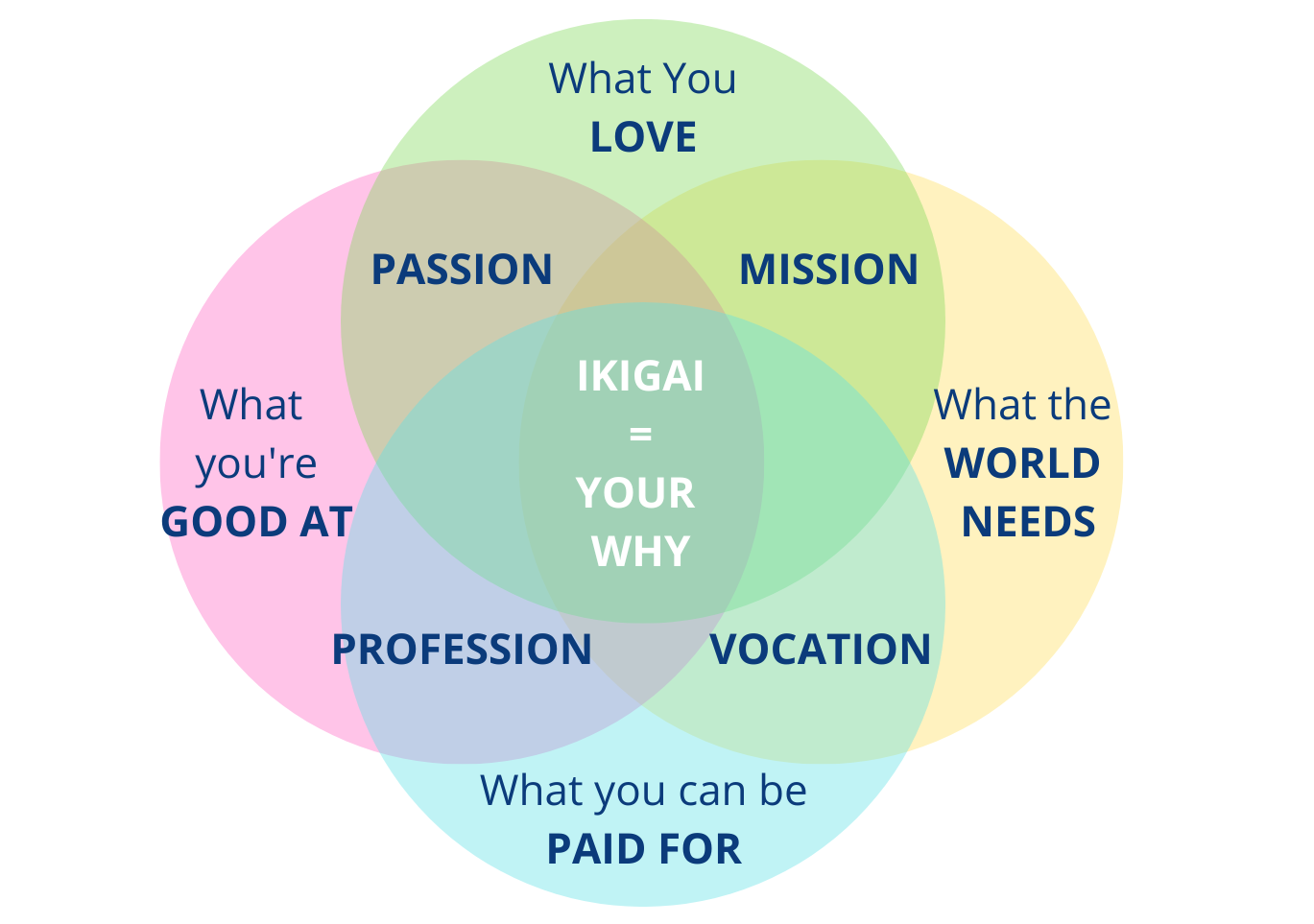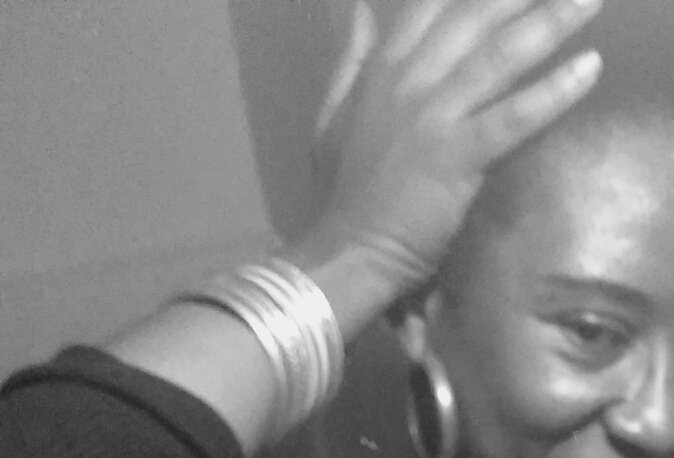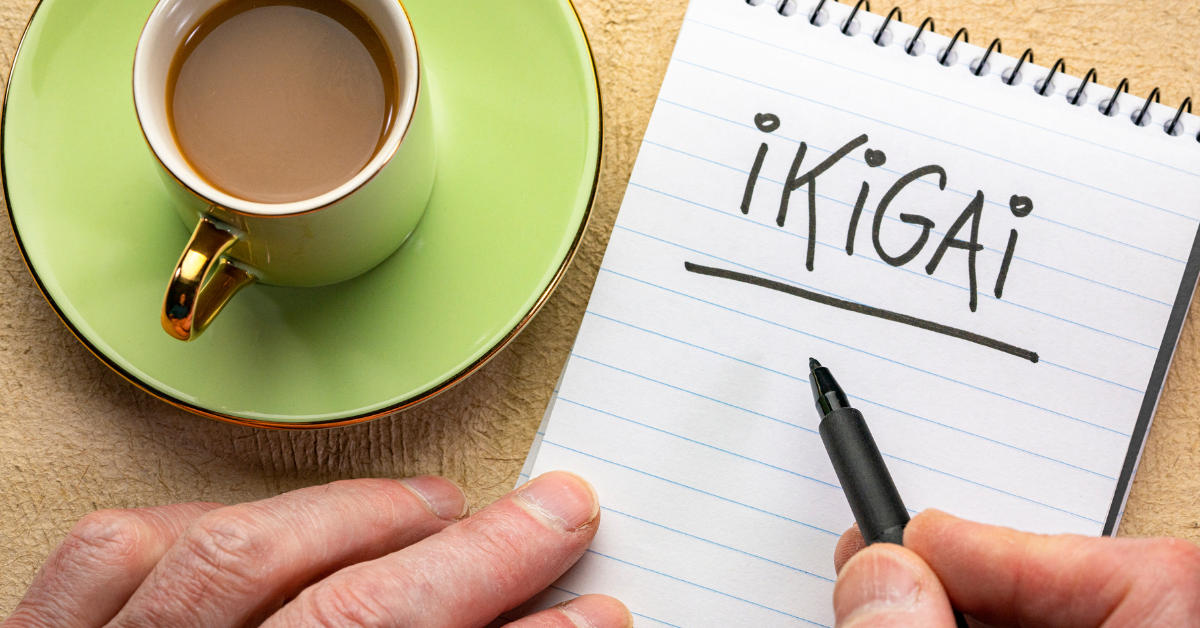Ikigai. The concept is Japanese. Life philosophical concept.
In English is spelled “ee-key-gai”.
Its meaning in Japanese? “Iki” means “alive” or “life”; “gai” means “benefit” or “worth”: the worth of being alive, the reason to live: your why.
Ikigai. O conceito é japonês. Um conceito filosófico da vida.
Em inglês lê-se “iki-gai”.
E o significado em japonês? “Iki” significa “vivo” ou “vida”; “gai” significa “beneficiar” ou “valor”: o valor da vida, a razão para viver: o teu “porquê”.
O Teu Porquê, as razões para viver, o teu Ikigai
When you have kids or any other people depending on you: it gets easier to put all that burden on them.
The burden of them being the reason to live. It can be a heavy burden on their shoulder - our dependents. Being the reason why we wake up, being responsible for us to be happy. Or unhappy.
In the end, that’s what it turns out to be.
Quando se tem filhos ou outras pessoas que são dependentes de nós: é fácil colocar todo o fardo neles.
O fardo deles serem a nossa razão de viver. Isso pode ser um fardo pesado nos ombros dos nossos dependentes. Serem a razão para nós acordarmos de manhã, serem responsáveis pela nossa felicidade. Ou infelicidade.
Porque no final é nisso que se transforma.
But not even they can save us from feeling a certain void (small or big) that emerge at times: and that happens, if something important within us is asking to be fulfilled, and it is not.
Sometimes we don’t even know what it is.
Mas nem eles no salvam do sentimento de vazio (pequeno ou grande) que ás vezes emerge: e isso ás vezes acontece , se qualquer houver qualquer coisa dentro de nós não está a ser preenchida.
Ás vezes nem sabemos o que é.
Let's make an incursion on this: with the help of Ikigai concept. Wich is a simple tool, a process of self-discovery:
We might get to be a lot happier, serving others as well, earning some money along the way, but without putting all the weight on others' shoulders, giving them, the responsibility for our happiness, for being the only reason why we wake up every day.
Vamos fazer uma incursão nisto: com a ajuda do conceito Ikigai.
Pode ser que consigamos ser mais felizes, e a servir os outros também, a ganhar dinheiro pelo caminho, mas sem colocar todo o peso nos ombros de outrso, para serem els os responsáveis, a razão de nós acordarmos todos os dias.
Because the other side of this, the dark side of it is: the burden of carrying the responsibility for others' happiness/unhappiness.
Can we prevent ourselves or others from being such beasts of burden? Should we make efforts to prevent that? Certainly.
For our sake and for the sake of the ones we love.
Porque o outro lado da moeda é mesmo esse, o lado-sombra: o peso de carregar a responsabilidade da felicidade/infelicidade dos outros.
Poderemos evitar sermos o por outros na posição de "bestas de carga"? Deveríamos fazer esforços para evitar esse peso? Certamente.
Por nós e pelos que amamos.
The others matter. You matter: In the name of balance
Os outros são importantes. Tu és importante: em nome do equilíbrio
We are social beings. We need some sort of heaviness, and density in our lives: it can’t just be flowers and a rainbow.
But the heaviness must come with its other side, the opposite: the fluidity, the lightness- There’s got to exist balance in there.
Somos seres sociais. Precisamos duma certo peso, uma certa densidade nas nossas vidas: não pode ser só flores e arco-íris.
Mas esta densidade deve vir com o outro lado, o oposto: a fluidez, a leveza. Tem que havar equilíbrio aí.
Our need for others, due to our social natures, can not overlap or annihilate our individuality. There must be an integration. In the name of balance. Equilibrium.
A nossa necessidade dos outros, devida a nossa natureza social, não pode sobrepõor-se nem anular a nossa individualidade.
Tem de haver uma integração. Em nome do equilíbrio. Equilibrium.
And that's where Ikigai shows up as a tool, a philosophy of life, to help us live a more fulfilling life. A life with our very personal “why”.
Trying to identify your personal Ikigay, will help you have that equilibrium, the meaningfulness.
E á aí que o Ikigai aparece como uma ferramenta, um filiosofia d evida, para nos ajudar a viver uma vida mais gratificante. Uma vida com um nosso "porquê" muito pessoal.
Tentar identificar o nosso Ikigai pessoal, ajuda-nos a ter a balança mais equilibrada, ajuda-nos a encontrar um significado maior.
Your personal Ikigai: The 4 spheres
O teu Ikigai Pessoal: as 4 esferas
Your Ikigai – is your why: the reason you get out of bed every day. Is your reason to live.
Your Ikigai lies in the intersection, in the middle of these four spheres:
- What you love
- What you are good at
- What the world needs
- What you can be paid for
O teu Ikigai – é o teu “porquê: a tua razão para sair da cama todos os dias. É a tua razão de viver.
O teu Ikigai mora na intersecção, no meio desses hemisférios:
- O que tu amas
- O que fazes melhor/ no que és bom (boa)
- O que o mundo precisa
- Pelo que podes ser pago(a)
Right in the middle of those spheres of your life: is where your bliss and happiness come.
When you find a way to fulfill those 4 spheres: you live a meaningful full life.
You live meaningful days, with less frustration, and more flow.

Mesmo no meio dessas esferas da tua vida: é dai que vem a tua felicidade.
Quando arranjas forma de dar resposta às 4 esferas: vais conseguir viver uma vida gratificante.
Vais viver dias gratificantes, com menos frustração, com um melhor fluxo.
And you'll see by yourself: that your individuality is served, as well as the presence of others in your life is cherished.
It's a win-win.
E vais ver por ti: a tua individualidade é reconhecida, assim como a presença de outros na tua vida vai ser estimada.
É um "win-win".
What you love
O que tu amas
This is a “You” sphere.
What You Love. Never mind if you’re not good at it: you love it, you do it.
It can b people, places, activities: anything that makes you feel genuine joy.
Esta esfera é só sobre ti.
O que Tu Amas. Não importa se és bom nisso: adoras, fazes.
Podem ser pessoas, sítios, actividades: qualquer coisa que te faça sentir alegria.
Let's suppose you are a lousy singer or a mediocre painter but you love doing it any way… Just do it. If it makes you feel joy: do it.
Could be anything that makes you happy: writing song lyrics, gardening, listening to music, playing an instrument, climbing walls, imitating the Scottish accent...
But when you do it: you feel pure bliss, a clean soul.
It doesn't matter where you're good at it or not. What you love.
Vamos supor que cantas mal, que pintas de forma medíocre mas gostas de fazê-lo na mesma… Faz isso. Se te traz alegria: faz isso.
Pode ser qualquer coisa que te traga alegria: escrever letras de músicas, jardinar, ouvir música, tocar um instrumento, escalar paredes, assobiar, imitar o sotaque escocês...
Mas quando o fazes: sentes-te alegria genuína, alma limpa.
Não importa se és bom nisso ou não. O que tu amas.
What the world needs
O que o mundo precisa
Here: is about the others.
And "the others" can be your nearest environment or the universe.
Family, friends, coworkers, neighbors, your communities online, your country, the world…
In your mind: what does the world needs now?
Aqui é sobre os outros.
E "os outros" pode ser o teu ambiente mais próximo ou o universo.
A família, os amigos, colegas de trabalho, a vizinhança, as tuas comunidades online, o teu pais, o mundo…
Na tua ideia: do que é que o mundo precisa?
What you can be payed for
Aquilo pelo que podes ser pago
Here is about you and others too. How can you serve the world and be paid for that?
In this area, you can think of the profession you have, the professions you already worked on, the things you want to learn to provide a service to others that can be monetized
We are social beings: part of our happiness is being useful to others.
Aqui é sobre ti e os outros. como é que podes servir o mundo e ser pago por isso?
Nesta esfera podes pensar na profissão que tens, nas que já exerceste, no que podes quere aprender para prestar um qualquer serviço aos outros que seja monetizável.
Somos seres sociais: parte da nossa felicidade passa por ser útil aos outros.
What you are good at
Aquilo em que és bom
This is a “You” sphere too.
Is not about the others, but is not necessarily related to what you love either.
Is about your skills, what you are very good at: whether is a natural talent or a learned skill.
Could be playing the guitar, could be listening to what is not being said by people, could be writing, could be the ability to interact with strangers could be your organizational skills.
Whatever it is: is what you do better.
Aqui também é sobre ti.
Não é sobre outros, mas também não tem necessariamente a ver com o que amas.
São as tuas competências, aquilo em que és bom a fazer: sejam talentos naturais, sejam competências aprendidas.
Pode ser tocar guitarra, pode ser entender aquilo que as pessoas não estão a dizer, pode ser a escrita, pode ser a tua capacidade de interagir facilmente com pessoas que não conheces, pode ser a tua capacidade organizativa….
O que for: aquilo que fazes melhor.
And in The intersections…
E nas intersecções…
In the intersection between what you love and what the world needs your going to find your mission
At the intersection of what the world needs and what can get paid for, you're going to find your vocation
At the intersection of what can get paid for and what you’re good at, you're going to find your profession
In the intersection of what you’re good at and what you love, your going to find your passion.
Na intersecção entre o que amas e do que o mundo precisa vais encontrar a tua missão.
Na intersecção entre o que o mundo precisa e aquilo pelo que podes ser pago, vais encontrar a tua vocação.
Na intersecção entre aquilo pelo que podes ser pago e aquilo em que és bom a fazer, vais encontrar a tua profissão.
E na intersecção entre aquilo em que és bom a fazer e o que amas, vais encontrar a tua paixão.
And right in the core of it, in the intersection of Mission-Vocation-Profession-Passion: there’s your Ikigai. The reason why you wake up every day.
The ideal is that every day you do something in the 4 spheres.
E mesmo no centro, aquilo que há de comum entre a Missão-Vocação-Profissão-Paixão: esse é o teu Ikigai. A tua razão para acordar todos os dias.
O ideal é que todos os dias faças algo, ou dediques algum tempo, a coisas que façam parte das quatro esferas.
Ikigai isn’t stagnant. Is process: it might change, progress.
And if you thinking about a change in life: maybe you should start by finding your Ikigai.
O Ikigai não é estanque. É um processo, pode ir mudando, progredindo.
E se estás a pensar em alguma mudança de vida: talvez devesses começar por identificares o teu Ikigai.
This short vídeo explains well and easily, how to do this simple exercise.
Este vídeo curto explica como fazer este exercício simples.
(I did it, and they recommend doing it in 30 minutes, I believe I did it in 45 minutes. Yes: that's the time you have to dedicate to yourself and walk more confidently in any new phase.
And when I finished it, it was there. It made sense, it was congruent and the information was organized and synthesized into two sentences.
It was all inside of me, but floating, maybe even a little chaotic: the exercise made it clearer).
(Eu fi-lo: o vídeo recomenda fazê-lo em 30 minutos, acredito que levei 40 minutos a completar. Sim. é tempinho que podes dedica a ti mesmo(a) e entrar nessa nova fase, com mais auto-confiança.
E quando terminei, estava lá. Fazia sentido, era congruente só que era informação que estava organizada e sintetizada em duas frases.
Estava tudo cá dentro mas a flutuar, talvez até mesmo um pouco caótico: o exercício tornou tudo mais claro).
The rules are: not thinking too much and be honest with yourself.
And then you just have to find the common things in the 4 spheres: that will be your Ikigai.
As regras são: não pensar demasiado e seres honesto(a) contigo.
E depois bastas encontrar a(s) coisa(s) comuns as 4 esferas: isso vai ser o teu Ikigai.
And living a balanced and fulfilling life is pretty much this: making sure that you fulfill your Ikigai – your reason to live, each and every day. It might be simpler than we imagine.
Give it a try: you’ll discover yourself and will make the process of decision-making a lot easier and relatable to your purpose.
E viveres uma vida equilibrada e gratificante é mais ou menos isto: garantir que satisfazes o teu Ikigai – razão de viver, todos os dias. Pode ser mais simples do que imaginamos.
Não custa tentar. Vais descobrir-te e tornar o processo de tomar decisões muito mais fácil e congruente com o teu propósito.
Getting Better Every Day
Ikigai Hugs
From Body&Soul!
References and Related Posts
https://bodyandsoulbizz.co.uk/personal-growth-commitments-end-year-balance-2021/
Video
Hey! I'm Eunice Veloso and you'll find more about me on my About Page
"In nature, nothing is lost, nothing is created, everything is transformed"
Antoine Lavoisier, 1789
The Law of the Conservation of Mass


Pingback: Having Determination. Having Faith. And Has Nothing To Do With Religion | Body&Soul
Pingback: Ter Determinação. Ter Fé. E Não Tem Nada A Ver Com Religião | Body&Soul